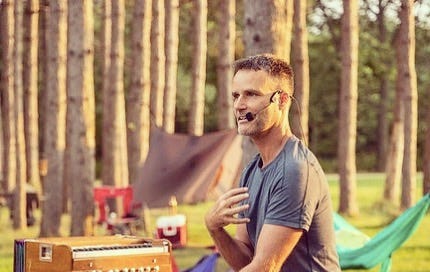“I try to see through the lens of other's perspectives, whether in a class setting, relationship, or normal conversation, even when I don’t resonate or agree with the lens through which the other person is sharing.” - Wade Gotwals
The best word to describe Wade Gotwals is magnetic. He draws you into a hug, into laughter, and into a deep heart-opening yoga practice. His 10 a.m. Sunday morning Vinyasa class was a part of my weekly routine while living in Chicago. The class was tough. Sweat would drip onto yoga mats across the room, but the energy was invigorating. You could be holding the most difficult pose, and Wade would still successfully draw a smile on your face and make you laugh. His positive energy is contagious.
Although yoga is inherently an individual practice, Wade's classes were not an individual pursuit. Partner poses ended nearly ever Sunday class, turning strangers into friends. The lobby of the yoga studio was lively before and after class. Quiet contemplation could be had during class, but the joy of seeing comrades dominated the energy leading up to and at the close of every class. By practicing yoga with Wade, you were a part of a community.
Wade strengthens and grows his yoga community through retreats and workshops. I had the pleasure of participating in both. He takes eager yogis on retreats in far-off lands a few times a year, and I experienced the Sacred Valley of Peru through Wade. Retreat-goers not only practiced yoga together twice a day, we ate together, hiked together, lodged together, explored together, and laughed together. I went into the retreat only knowing Wade and left with great friends.
Wade's workshops are not all that different. Sure, he teaches one how to guide others through their yoga practice—in my case, by using creative sequencing—but ultimately he teaches one how to connect and practice with their students. How to guide them through asanas—yoga poses—that might be challenging for some with an open heart and open mind, and with joy.
For Wade, education is about "teaching life lessons and sharing tools that will equip the student with a clear roadmap aimed at helping them to navigate this ever-changing world we live in." Yoga classes do this in a very distinct way: They teach lessons about endurance by progressing through challenging poses, including sitting still in silence with one's own thoughts. And they equip practitioners with tools, such as how to breath deeply and remain calm when one's mind is racing, to deal with the many obstacles that life presents.
To be educated, according to Wade, one needs to have "received the knowledge of how to work within both hemispheres of the mind and to integrate the analyzing/cognizing and the creative/intuitive." One needs to understand how the mind works and be able to tap into its different functions. An educated person, in other words, is not just focused on "the ability to problem solve, recite, and memorize," but also on "how emotions are experienced and where creativity and intuition are embraced and factored in." The end result of being educated in such a way is to adopt "a fully mindful approach to life and its circumstances."
A mindful approach to life can manifest in numerous ways. Wade described to me an experience he had with a spiritual teacher in India who challenged him to listen and understand diverse perspectives, rather than being quick to defend his own, showcasing mindfulness in action.
"I was receiving Satsang (spiritual teachings in a group setting) with a spiritual teacher in India, and we were engaging in Dharma talks, where he was leading a talk with true curiosity about each of our viewpoints on the subject. His approach was to see each person's perspective through their own lens. The teacher was not negating our perspective on different topics but finding out how we came to that approach and having us question our approach to that specific subject. He encouraged us to see where there was room to expand our vision and approach on that topic versus giving us a right or wrong answer dictated by one person's views or a majority's viewpoint.
That approach to teaching was mind-blowing to me because it encouraged me to investigate my thought process and belief system, with the opportunity to expand my views that had been deeply ingrained, instead of debating or defending them, which in a way felt like contracting my mind. This lesson of expanding during conversations and opening to new ideas has always been with me while I teach. I try to see through the lens of other's perspectives, whether in a class setting, relationship, or normal conversation, even when I don’t resonate or agree with the lens through which the other person is sharing."
This sort of mindfulness shines through during yoga classes, workshops, retreats, and casual interactions with Wade. His perspective on education and being educated, and what he himself has learned as a student, provides a model for what it means to be humble, open, and willing to challenge oneself.




